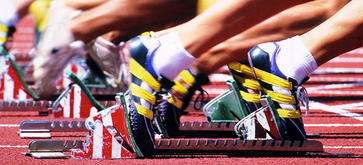Back to Sports & Endurance
New Study Finds That Athletes Lacking This Elusive Vitamin Are Weaker, Slower and Less Explosive!

06/2016
A new study from the University of Tulsa has found that low levels of vitamin D can lead to a significant drop-off in athletic performance.
The study examined 103 college athletes from three separate NCAA athletic programs in the southern U.S. First, researchers determined the athletes' vitamin D status. To be considered adequate in vitamin D, participants had to have serum levels greater than 75 nmol/L of 25-hydroxyvitamin D. Insufficient was defined as serum levels between 75 and 50 nmol/L, and deficient was defined as serum levels below 50 nmol/L.
Sixty-eight percent of the participants were found to be adequate in vitamin D, while 23 percent were insufficient and 9 percent were deficient.
After having their vitamin D levels tested, athletes were assessed in four physical tests—the Vertical Jump, Shuttle Run, Triple Hop for Distance and One-Rep Squat max. Athletes who had lower vitamin D levels had significantly lower performance scores in every test, showing that their strength, explosiveness, speed and agility were all affected.
"These findings demonstrate that even athletes living in the southern U.S. are at risk for vitamin insufficiency and deficiency and that maintaining adequate vitamin D status may be important for these athletes to optimize their muscular strength and power," the study's authors concluded.
The new study is just the latest in a line of research that's found a strong correlation between vitamin D and athletic performance. A study published in the journal PLOS One found that vitamin D level was strongly linked to better sprinting capacity, muscle strength and VO2 max in professional soccer players. Perhaps most intriguing is the 2015 study published in the American Journal of Sports Medicine, which found that "professional football players with higher vitamin D levels were more likely to obtain a contract position in the National Football League." Essentially, players with optimal vitamin D levels were better football players than those with lower levels.
What makes the connection between vitamin D and athletic performance especially important is that many athletes are unaware of their deficient status. Dietary sources of vitamin D are scarce, but it is found in egg yolks, fatty fish and fortified products like cereals and milk. However, the easiest way to get vitamin D is from sunlight. Human skin creates significant amounts of vitamin D when it's exposed to sunlight. Given that fact, you would expect vitamin D deficiency to only affect athletes in colder, less sunny areas. However, this study found that even athletes in sun-drenched states like Texas are at risk.
So, how much vitamin D do you actually need? The Institute of Medicine recommends 600 daily International Units for most adults, but many sports dietitians recommend higher amounts for athletes. A recent article from The Wall Street Journal states that "some sports dietitians encourage athletes to get 1,000 to 2,000 IU [of vitamin D] daily."
http://www.stack.com/a/new-study-finds-that-athletes-lacking-this-elusive-vitamin-are-weaker-slower-and-less-explosive
A new study from the University of Tulsa has found that low levels of vitamin D can lead to a significant drop-off in athletic performance.
The study examined 103 college athletes from three separate NCAA athletic programs in the southern U.S. First, researchers determined the athletes' vitamin D status. To be considered adequate in vitamin D, participants had to have serum levels greater than 75 nmol/L of 25-hydroxyvitamin D. Insufficient was defined as serum levels between 75 and 50 nmol/L, and deficient was defined as serum levels below 50 nmol/L.
Sixty-eight percent of the participants were found to be adequate in vitamin D, while 23 percent were insufficient and 9 percent were deficient.
After having their vitamin D levels tested, athletes were assessed in four physical tests—the Vertical Jump, Shuttle Run, Triple Hop for Distance and One-Rep Squat max. Athletes who had lower vitamin D levels had significantly lower performance scores in every test, showing that their strength, explosiveness, speed and agility were all affected.
"These findings demonstrate that even athletes living in the southern U.S. are at risk for vitamin insufficiency and deficiency and that maintaining adequate vitamin D status may be important for these athletes to optimize their muscular strength and power," the study's authors concluded.
The new study is just the latest in a line of research that's found a strong correlation between vitamin D and athletic performance. A study published in the journal PLOS One found that vitamin D level was strongly linked to better sprinting capacity, muscle strength and VO2 max in professional soccer players. Perhaps most intriguing is the 2015 study published in the American Journal of Sports Medicine, which found that "professional football players with higher vitamin D levels were more likely to obtain a contract position in the National Football League." Essentially, players with optimal vitamin D levels were better football players than those with lower levels.
What makes the connection between vitamin D and athletic performance especially important is that many athletes are unaware of their deficient status. Dietary sources of vitamin D are scarce, but it is found in egg yolks, fatty fish and fortified products like cereals and milk. However, the easiest way to get vitamin D is from sunlight. Human skin creates significant amounts of vitamin D when it's exposed to sunlight. Given that fact, you would expect vitamin D deficiency to only affect athletes in colder, less sunny areas. However, this study found that even athletes in sun-drenched states like Texas are at risk.
So, how much vitamin D do you actually need? The Institute of Medicine recommends 600 daily International Units for most adults, but many sports dietitians recommend higher amounts for athletes. A recent article from The Wall Street Journal states that "some sports dietitians encourage athletes to get 1,000 to 2,000 IU [of vitamin D] daily."
http://www.stack.com/a/new-study-finds-that-athletes-lacking-this-elusive-vitamin-are-weaker-slower-and-less-explosive
